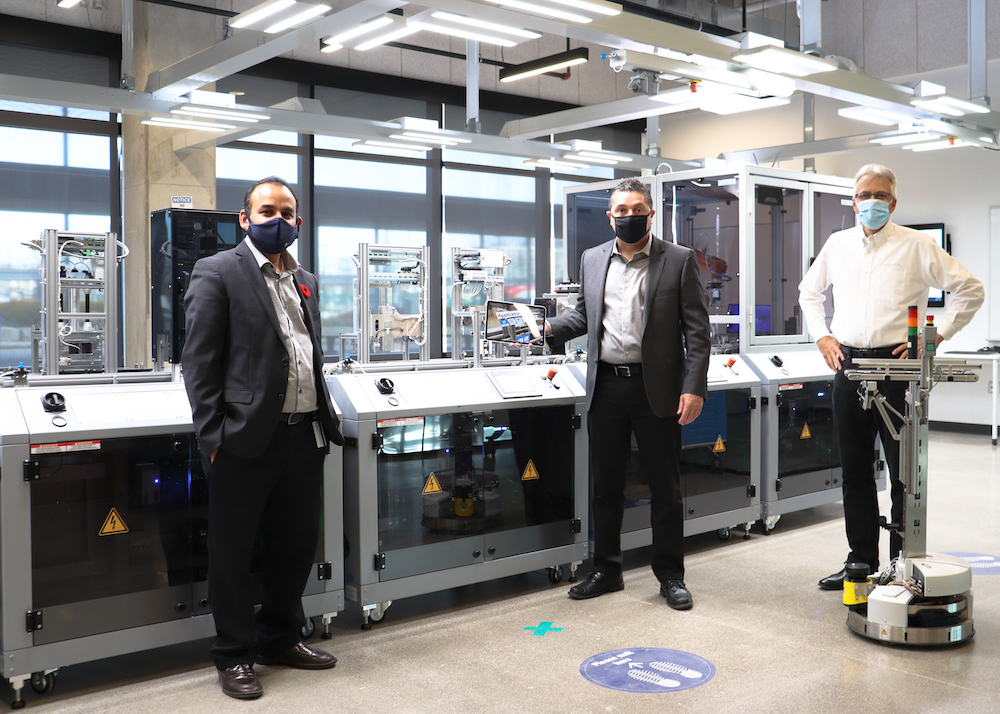
Connected classrooms: Cyber-physical labs advance Industry 4.0 careers
July 21, 2021
By Tony Oran
 The CP Factory at Humber College. Photo: Festo/Humber College
The CP Factory at Humber College. Photo: Festo/Humber College Today’s digital economy requires a new approach to technical job training.
In order to prepare college students for high-tech industrial careers, you have to bring the technology to them. That’s easier said than done for most schools, however. The key is to start small, start now and scale up over time.
In 2018, Festo Didactic embarked on a five-year workforce development training program with Humber College in Toronto. This partnership marked the first installation of a cyber-physical (CP) factory outside Quebec.
Festo’s CP Factory, housed in the Barrett Centre for Technology Innovation, is a comprehensive and expandable smart factory model that allows students and instructors to engage in industrial simulations using cutting-edge technology that supports experiential learning in production, logistics and quality assurance.
The term “Industry 4.0” represents the fundamental change taking place in the production and manufacturing industries. As real world and virtual reality continue to merge, modern information and communication technologies have combined with traditional industrial processes, thereby redefining numerous areas of production.
The CP Factory (pictured above) reflects the new Industry 4.0 paradigm by illustrating the practical implementation of a networked factory. As a modular factory, it’s designed to represent the entire value chain. The main training areas include: assembly line, logistics, production, production planning and control/MES (manufacturing execution system), lean production and quality assurance.
The STEM skills gap persists, and will continue to pose a real challenge to employers well into the next decade.
Adopting and implementing Industry 4.0 in the workplace requires seamless networking of people, machines, and plants all working together through complex IT and IoT systems. The CP Factory model for classrooms covers the relevant digital communications systems and equipment used by professionals, allowing a comprehensive simulation of real-world industrial processes.
While industry is struggling to upgrade and upskill to new Industry 4.0 standards in order to remain competitive, employers are also desperate for inventive, digitally savvy workers who are capable of adapting quickly in order to work around market barriers and disruptions.
Increasing adoption of Industry 4.0 and 5G has propelled the demand for highly automated systems across several industries. In fact, the global industrial automation market valued at $168 billion in 2019 is projected to reach $326 billion by 2027.
However, the STEM skills gap persists, and will continue to pose a real challenge to employers well into the next decade. According to Deloitte and The Manufacturing Institute, the employability gap in U.S. manufacturing during the next decade is anticipated to reach the highest level ever recorded, higher than the earlier estimate of two million unfilled jobs during 2015–2025.
Dedicating and prioritizing access to better STEM education is the cornerstone of sustainable companies and career paths. Innovation and experimentation with industry-approved training models such as the CP Factory are key to preparing qualified candidates for the new digital workforce.
Touring the CP Factory can be an engaging and fun way to spark curiosity for people of all ages and academic backgrounds. Since its grand opening in April 2019, over 10,000 visitors have experienced the Festo CP Factory at Humber College’s Barrett Centre for Technology Innovation. Approximately 20 per cent of visitors include industry professionals, the local community and government representatives.
Dedicating and prioritizing access to better STEM education is the cornerstone of sustainable companies and career paths.
To date, nearly 2,000 students have been introduced to Industry 4.0 technologies through the CP Factory, equipment in skills mechatronics, and the MPS station in the STEAM Learning Lab during STEAM workshops. Additionally, 80 faculty and staff have participated in related corporate training activities, courses, webinars and workshops.
While funding challenges are a reality for many schools, that should not dissuade educators from having open and honest conversations with employers. Starting small can lead to a significant positive impact for students in the long run.
By continuing to invest time, skills and valuable resources into building education-to-career pipelines, together we are forging solid new pathways that will benefit everyone.
_____
Tony Oran serves as vice-president of sales and marketing at Festo Didactic North America, a provider of industrial education equipment and training. Tony also oversees Festo’s award-winning apprenticeship program. tony.oran@festo.com
This article appears in the June 2021 issue of Manufacturing AUTOMATION and is part of a series giving manufacturers a look behind the walls of the Barrett Centre for Technology Innovation. For more information on the Centre, please contact askbarrettcti@humber.ca.